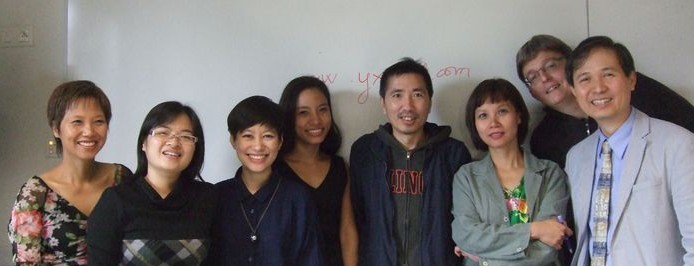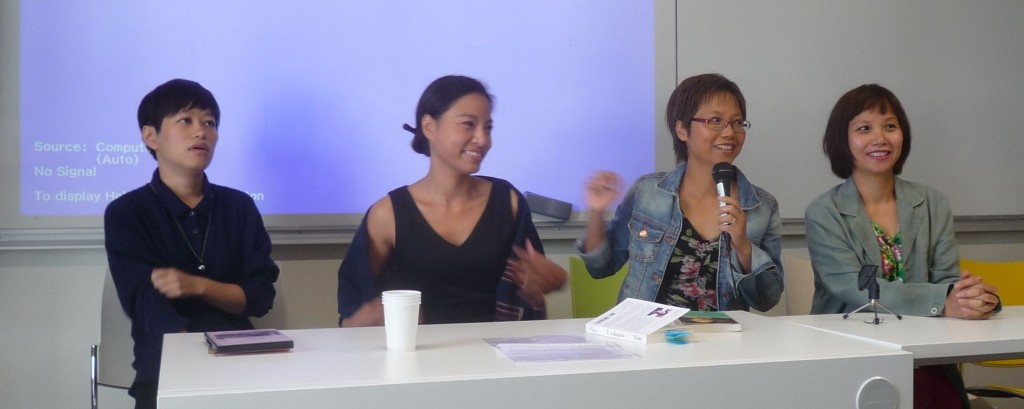Two main centers of Vietnamese studies in France, the Insitut de Langues et Cultures Orientales (INALCO), and Paris 7 – Jussieu, came together to launch, for the first time ever, a joint series of conferences to celebrate and discuss the current state of Vietnamese Film, Art, and Writing. The first conference featured a working panel headed up by Professor Đoàn Cầm Thi , consisting of three members: director and poet Dạ Thảo Phương, filmmaker Trương Quế Chi, and novelist Thuận. Each artist presented excerpts from their work before engaging in a debate with the audience: Lady Piano by Dạ Thảo Phương, Black sun / Mặt trời đen by Trương Quế Chi, and T. a disparu by Thuận.
The panel of four Vietnamese women artists and scholars was a pleasant surprise for the packed audience; Vietnamese studies have long been dominated in France by male experts and artists – the dissident author Dương Thu Hương being an exception to the rule. All four panelists considered themselves “Vietnamese living in France” rather than being French-Vietnamese. Professor Đoàn Cầm Thi has proclaimed in previous conferences that the difference between being Vietnamese and being a Vietnamese abroad means very little, especially in artistic production.
The public debate was of particular interest and started off with the critical question of how Vietnamese artists are able to express themselves within the confines of government censorship. It turns out that in reality, government censorship of movies has not been a huge issue. Dạ Thảo Phương outlined the process of making movies in Việt Nam. Approval by the Ministry of Culture and the Cultural Police is obtained only for the finished work. Pointing out that Vietnamese movie makers are not required or forced to make specific types of movies, Dạ Thảo Phương felt that the key issue was the persistent beliefs maintained by the artists themselves. Government censorship was not the problem; artists’ inclination towards self-censorship was the problem.
Trương Quế Chi felt differently, asserting that the younger generation of film makers had no problems with self-censorship. She contended that the ubiquity of the internet offered young Vietnamese access to global cinematography. This helped film makers develop a personal cinematographic language, one that was on par with any of the world’s major movie idioms. The current global financial crisis also influenced the style of new movies. Film productions no longer rely on domestic funding; many artists reach out towards foreign funding, further distancing themselves from a purely national outlook.
The panel then discussed how both film makers started off their artistic careers as authors. Dạ Thảo Phương stated that “Writing, film making, making love, cooking. These are all different ways of expressing oneself, of living, of conceiving the world.” Artistic inspiration was a force needed to extricate oneself from the inertia of normalcy. Trương Quế Chi declared that “Writing is a difficult, arduous, painstaking effort to put down word by word the precise rendering of the world.”
Both artists agreed that fellow panelist Thuận’s work, such as the popular novel T mất tích, had a profound impact on Vietnamese artists. In common literature, the reductionist tendency is to portray Việt Nam as a country of only censorship, poverty, or corruption. Thuận refused to fit that mold, condemning such writings as limiting Việt Nam to “gentle women and beautiful landscapes.” Dạ Thảo Phương qualified T mất tích as a literary pinnacle while Trương Quế Chi admired Thuận’s campy yet precise vision of contemporary Vietnamese society. She attributed Thuận’s capacity to accurately portray Việt Nam to the distance the novelist attained by residing in France. Thuận’s work helped redefine Việt Nam in modern contemporary literature. To Thuận, however, the question is not how one redefines Việt Nam; but rather, “the eternal question is, how does one write?”

The next conference will be held from 12:30 to 3 p.m., on November 9, 2012 with Marcus Manh Cuong Vu presenting YXINEFF’s 2012 online film festival of Vietnamese short films.
Dạ Thảo Phương is one of Việt Nam’s best-known contemporary poets. At 18, she won first prize in a poetry competition held by the Vietnamese National Writers’ Association and the Swedish state development agency. Since, her poetry has been published in over 20 collections and retrospectives in Việt Nam, the United States, and France. She began to explore film making after studying at the Goethe Institute’s DocLab program in Hà Nội.
Thuận, or Đoàn Ánh Thuận, currently lives in France with her partner, the artist Trần Trọng Vũ. She graduated from the English Department of the Foreign Language Teachers University Pyatigorsk (Russia) in 1991, and studied English literature at the University of Paris 7 (1991-1992) and contemporary Russian literature at the University of Sorbonne (1992 -1993). In 2008, she was awarded the Writers’ Union Prize, Việt Nam’s top literary honor. Her book Chinatown was reviewed here in 2010.
Đoàn Cầm Thi is the head of the Vietnamese section of INALCO (Institut national de langues et civilisations orientales). She has published Écrire le Vietnam contemporain. Guerre, corps, littérature (Presses de l’Université Paris Sorbonne, 2010), Au rez-de chaussée du paradis. Récits vietnamiens 1991-2003 (Philippe Picquier, 2005), Poétique de la mobilité. Les lieux dans Histoire de ma vie by George Sand (Rodopi, 2000). She has also translated into Vietnamese, La Douleur de Marguerite Duras (Hanoi, Les Éditions des Femmes, 1999), and into French: L’Embarcadère des femmes sans mari by Duong Huong (Aube, 2002), Chinatown by Thuân (Le Seuil, 2009), T. a disparu by Thuân (Riveneuve, 2012). She was awarded “Le mot d’or de la traduction 2005” (Unesco – AIF – Société française des traducteurs). She currently heads up the Vietnamese Literature collection at the Riveneuve publishing house.
Trương Quế Chi studied film at the University of Lyon 2 University in France. Primarily known as a young poet from Hà Nội, she released her first collection of poems Tôi đang lớn at 18. She has participated in poetry readings at the British Council in Hanoi and the Vietnamese cultural center in France. She is currently exploring film as means to communicate with the world through personal stories. Les Cheveux qui Poussent à l’Envers, her first short (2010), can be seen on YXINEFF’s website.
Essay was written by Ly Lan Dill, who was born in Viet Nam, grew up in the US, and is now a Paris-based translator. Photos belong to Đoàn Cầm Thi. Edited by Daniel Nguyen.





Chào !!
I would like to contact Doàn Câm Thi or more exactly to send her a copy of my graphic novel “Une si jolie petite guerre”, published by Denoël Graphic, which came out on Oct 18, 2012. Any idea of her address ? Of course, I suppose I could send it to INALCO in Paris ?
Yours,
Marcelino Truong
Bonjour Marcelino,
Ce sera avec plaisir que je vous inviterai à l’Inalco.
Votre nouveau livre intéressera nos étudiants. Merci de m’écrire pour qu’on puisse fixer une date :
Voici mon mail : [email protected]
Bien à vous
Doan Cam Thi